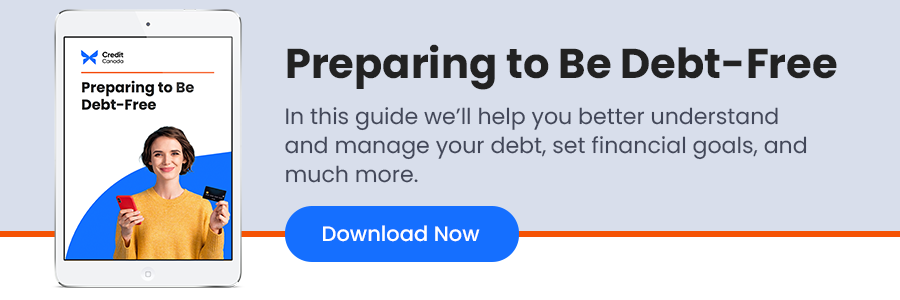
5 Financial Habits for Getting Out of Debt
Creeping credit card balance here, lines of credit there — before you know it, you’re sky-high in debt that has you awake at night. But accumulating debt doesn’t typically happen overnight. It tends to be the result of a number of different factors, and sometimes one of those factors are our habits.
At Credit Canada, we’ve helped many clients look through their financial history to learn more about their financial habits. This can include months of late payments, leveraging credit with more credit, or living without a clear budget before realizing you’re in financial trouble.
Luckily, there are healthy financial habits we can build that can actually help us get out of debt.
5 Habits That Can Help You Get Out of Debt
Our CEO Bruce Sellery chatted with CPA and author of Millenial Money Maker, Conor Richardson on the Moolala podcast. Here we recap and share Richardson’s five steps to rewire your brain for financial success and how they can help anyone get out of debt.
1. Set an Intention to Focus Action
You can’t change your habits without an intention. So the first step to establishing any new habit is setting a clear intention and making a promise to yourself to stay accountable.
Say you’re a serial Uber-rider, and you spend $500/month on the ride-sharing app. Thinking about the lost dollars isn’t enough to change behaviour. Once again, you'll be faced with a similar situation and likely react the same way.
For example, after going out with friends, an Uber ride home can seem like a necessary cost, so you'll likely order one.
So, the first step is to set an intention – a realistic promise to yourself that you will make a change.
Sarah from Clever Girl Finance puts it nicely:
“An intention is less specific than a particular goal. It [intention] reflects a purpose or attitude…based on your personal values…and direction you want your life to move towards.”
Bottom line? You know whether you have the attitude to change or if you need more time.
So a quick recap — step 1 is to make an intention and decide what you want to change.
After setting an intention, anything is possible as long as you stay consistent.
Staying Consistent for 90 Days Builds a Habit
Another key component in rewiring your brain is the act of sticking with the habit itself.
When’s the last time you tried tracking your spending? We’ve all been guilty of keeping receipts and tracking monthly spending, only to give up after a month. Those first few weeks can be “gruelling,” as Richardson puts it.
Then, that Excel spreadsheet sits alone in the depths of your computer folders. Lost and forgotten until your next burst of motivation.
The hardest part of a habit is the discipline required to keep the momentum. For example, Richardson says you need 90 days to rewire your neuroplasticity to turn your new reward into something that releases dopamine, the happy hormone. Other experts assert similar, with two medical experts claiming 66 days is the sweet spot for health habits.
2. Awareness Encourages Change
Are you the type of person who avoids reviewing their credit card statement? We’ve all been there, where browsing through all those authorized purchases can awaken a sense of panic and shame.
But diagnosing your financial habits is a vital habit in itself for financial stability. And to do that, you’ll have to start looking through those credit card statements:
- Review the last 2-3 months of your credit card statements.
- Highlight and count the purchases that you didn’t really need.
- Identify the poor cues behind your habits and think about ways to change them.
3. SMART Goals Sustain Your Momentum
Ever feel like you don’t know what you’re working toward? SMART goals make it abundantly clear with their five properties: specific, measurable, achievable, relevant, and timely.
“Reducing credit card debt” is a good start but nowhere near enough. That’s an intention at best. To make it a SMART goal, here’s how we can position it:
Reduce $5,000 of credit card debt to $0 in 12 months.
If you separate that into equal monthly payments, that’s about $416/month you’ll have to come up with — a commitment, but not impossible. You can either reduce spending or increase income, with the former being more popular and attainable.
4. Reverse Engineering Your Mindset Makes New Habits Easier
Think about your day-to-day life. Richardson describes our habits as following a simple sequence:
Cue. Routine. Reward.
If you follow the same sequence every day, you won’t fix your debt situation. That’s why “re-circuiting” or “rewiring” your habits can be essential to creating better financial habits.
To rewire your brain for success, changing some of those cues, routines, and rewards is all it takes.
Here’s an example of the sequence behind a poor credit habit:
- Cue: Identifying something you want with no budget in mind
- Routine: Swiping your credit card
- Reward: Obtaining the object without any further thought
A recipe for happiness? Temporarily, but that can quickly turn into a debt disaster.
Instead, establishing a more responsible financial habit can look like:
- Cue: Identifying something you want with no budget in mind
- Routine: Paying in cash to ensure you can afford it
- Reward(s): Obtaining the object AND a longer-term reward of limiting debt
See the difference? The first sequence can lead to a present, short-term pleasure, but with long-term financial chaos. The second offers you a similar short-term pleasure but adds an extra reward of future stability due to changing the routine.
The cue-routine-reward model might sound similar to the Hook Model – a marketing tactic Nir Eyals describes as including triggers and actions that lead up to rewards.
Now, how do you keep yourself satisfied in your new routine? Keep reading to find out!
5. Tracking Progress Keeps You Enthusiastic and on Track
Keeping tabs on your progress increases your chance of reaching your goal. That’s not an empty anecdote — the American Psychological Association proves it. Similarly, tracking your progress can help you build new financial habits and achieve your goals.
Here are some things you might try:
- Calendar reminders for check-ins: Financial habits can take about 90 days to form, so you can schedule a calendar notification every 15 days to remind yourself to stay on track.
- Review numbers frequently: What's your monthly savings goal or monthly debt reduction goal? Set time at the end of every month to ensure you reached it and investigate why if you didn’t.
Reward yourself: Treat yourself to something that brings you joy every time you meet a progress goal. It can be something as simple as going on your favourite hike or a night out at the movies.
The Biggest Pitfall for Establishing Healthy Habits
According to Richardson, the biggest pitfall in establishing new habits is aiming too small. Of course, that looks different for everyone. Here’s an example:
Let’s say you have a persistent takeout habit. You order DoorDash at least three times a week and splurge on expensive sushi at least one of those times. Perhaps you make a goal to reduce your takeout from three to two times per week, and order sushi only once every other week.
Want Richardson’s advice? Dream bigger. You might want to change your financial relationship with food, but you won’t do that by dipping your toes into a new habit.
Instead, try limiting your three-times-per week takeout to only once a week, and save the sushi for special occasions.
The final pièce de résistance for your new and improved financial habits?
Get Support from Friends, Family, and an Accredited Credit Counsellor
Sometimes telling people your goals makes them scarier — you feel more accountable and don’t want to disappoint them! A trusted friend, family, or partner can help you on your journey toward greater financial success, be it through reminders, funny jokes, and cheerleading support.
Still need some encouragement? Book a free appointment with one of our certified credit counsellors — we’d love to help you pivot your financial habits into a rock-solid plan for crushing debt and feeling successful! Schedule a consultation today!
Frequently Asked Questions
Have questions? We are here to help
A Debt Consolidation Program (DCP) is an arrangement made between your creditors and a non-profit credit counselling agency. Working with a reputable, non-profit credit counselling agency means a certified Credit Counsellor will negotiate with your creditors on your behalf to drop the interest on your unsecured debts, while also rounding up all your unsecured debts into a single, lower monthly payment. In Canada’s provinces, such as Ontario, these debt payment programs lead to faster debt relief!
Yes, you can sign up for a DCP even if you have bad credit. Your credit score will not impact your ability to get debt help through a DCP. Bad credit can, however, impact your ability to get a debt consolidation loan.
Most people entering a DCP already have a low credit score. While a DCP could lower your credit score at first, in the long run, if you keep up with the program and make your monthly payments on time as agreed, your credit score will eventually improve.
Anyone who signs up for a DCP must sign an agreement; however, it's completely voluntary and any time a client wants to leave the Program they can. Once a client has left the Program, they will have to deal with their creditors and collectors directly, and if their Counsellor negotiated interest relief and lower monthly payments, in most cases, these would no longer be an option for the client.

